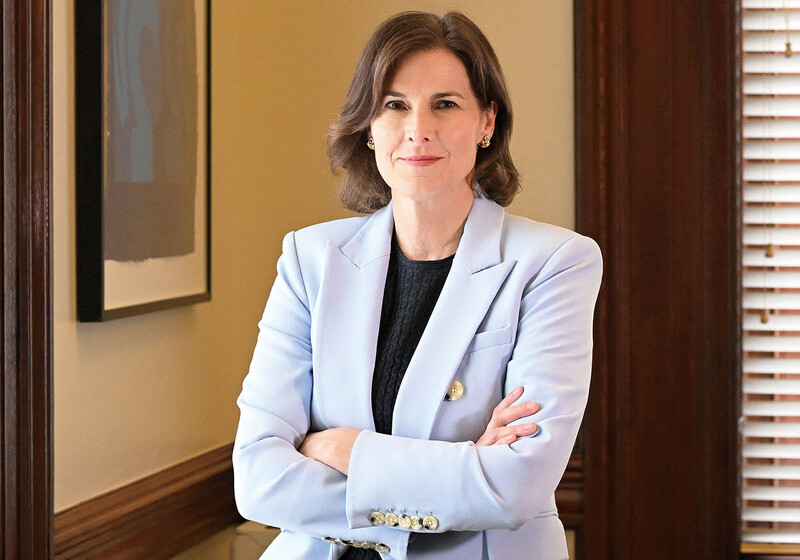Throughout the 250th, alumni and guests will be invited to join scholars, public figures, and other experts taking on issues of the day in depth. Planned by the Columbia 250 office, the Provost, and Columbia faculty, the symposia will bring together some of the most distinguished figures working in each field from around the world. The Columbia 250 symposia series will launch on October 16-17 with two symposia: one on genetics, and another on constitutionalism and democracy.
Constitutions, Democracy, and the Rule of Law: October 16–17, 2003
Constitutions, Democracy, and the Rule of Law” broaches issues of law and liberty, posing questions made particularly pressing by the September 11 attacks and subsequent terrorist and anti-terrorist activity. At what point do constitutions make it too difficult to secure the safety of a nation’s citizens? How can those who frame governmental systems find the right balance in protecting both individual rights and the collective rights of the state?
The symposium, held at Miller Theatre on October 16 and 17 during opening weekend, is chaired by Jon Elster, Robert K. Merton Professor of Social Sciences, and Akeel Bilgrami, Johnsonian Professor of Philosophy. Two days of sessions will explore the companion issues of whether, and how, constitutions constrain governments, and what impact constitutions have in a time of heightened concerns for international, national, and individual security.
Participants are expected to include Michel Rocard, prime minister of France from 1988 to 1991 under François Mitterrand, considered by many to be one of the most incisive politicians to hold European office in the last quarter century; philosopher and mathematician Antanas Mockus, current mayor of Bogotá, Colombia; and Joseph Stiglitz, Columbia’s Nobel Prize–winning economist.
The exchange between experienced politicians and academic theoreticians is at the core of the experience the symposium seeks to create. “This is a place to test our intuitions against sophisticated thinking and vice versa,” Bilgrami says. “It is our noble hope to have a thoughtful discussion.”
Columbia’s predecessor, King’s College, educated some of the most influential shapers of American government, among them Gouverneur Morris, John Jay, and Alexander Hamilton. Columbia has educated two U.S. presidents, eight Supreme Court justices, and builders of other nations, including Bhimroa Ambedkar, father of India’s constitution, and Pixley Seme, a founder of the African National Congress. So as they grapple with the fundamental issues of constitutional rule and freedoms, the symposiasts will carry forward a Columbia tradition in constitutional thinking.
In keeping with the topic of this symposium, Columbia is hosting the taping of a Fred Friendly Seminar on October 15 on the issue of liberty and terror.
Genes and Genomes: Impact on Medicine and Society: October 16–17, 2003
In “Genes and Genomes: Impact on Medicine and Society,” held in Roone Arledge Auditorium on Thursday, October 16, and Friday, October 17, participants will address the significance of recent genetic research and its application in a variety of disciplines. Among the expected participants are three Nobel Prize winners and several leaders of the Human Genome Project.
Organizing the symposium are Joanna Rubinstein, associate dean for institutional affairs for Columbia University Health Sciences, and Thomas Jessell, professor of biochemistry and molecular biophysics at Columbia’s Center for Neurobiology and Behavior and a principal investigator at the Howard Hughes Medical Institute. Participants are expected to include Sydney Brenner, MD, winner of the 2002 Nobel Prize in Physiology or Medicine; Michael Brown, MD, winner of the 1985 Nobel Prize in Physiology or Medicine; Joseph L. Goldstein, MD, winner of the 1985 Nobel Prize in Physiology or Medicine; Philip Kitcher, professor of philosophy; and Jeffrey Sachs, director of The Earth Institute.
“Over the next 10 to 15 years, genes and genomics will dramatically reshape the treatment of disease, the field of medicine, and society itself,” says Rubinstein. “Our hope is to put the groundbreaking scientific progress of recent years in context with the help of thinkers from a variety of different perspectives, including medicine, science, philosophy, human rights, and economics.”
The symposium includes three sessions. The first, “Genes, Genomes, and Evolution,” will delve into the history of the field of genetics and the links between the development of organisms, their evolution, and the emergence of our species. “Genes, Genomes, and Medicine” will forecast how genomics may influence the diagnosis and treatment of human diseases, from cancer and cardiology to abnormal behavior. The final session, “Genes, Genomes, and Society,” will explore the broader implications of the availability of genetic information. How will genetically modified foods affect the world economy? How will insurers make use of genetic information in determining a pricing policy for medical plans? How will genetic understanding change our concepts of civilized society, human individuality, and free will?


